Postpublished at 09:11 BST 4 August 2014
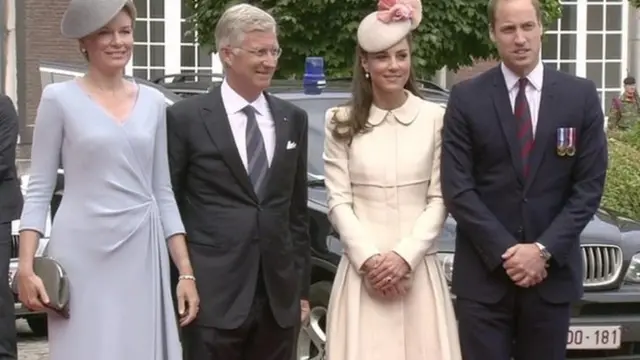
Dignitaries are continuing to arrive in Liege for a service to remember the start of the conflict, hosted by the Belgian King and Queen, pictured left.
Monday 4 August 2014 marked the 100th anniversary of the start of Britain's involvement in WW1
About 17m soldiers and civilians worldwide were killed between 1914 and 1918
Royal Family members and world leaders attended commemorative events in the UK and elsewhere
An international ceremony of reconciliation was held outside the Belgian city of Mons
The day's events ended with a candle-lit vigil at Westminster Abbey and "lights out" events around the UK
Tom Moseley, Patrick Evans, Dhruti Shah, Anna Jones, Claire Bates, Nick Eardley, Kerry Alexandra, Kate McGeown and Gerry Holt

Dignitaries are continuing to arrive in Liege for a service to remember the start of the conflict, hosted by the Belgian King and Queen, pictured left.
Alan Parsonage in Dubai emails: My grandfather was called Edward Butler, he was born in 1900 in Hull. He joined the Royal Engineers at some point early in the First World War, he was underage but hid this from the army. When deployed in France the army found his true age, as a result he was posted to Ireland as this was deemed to be a safer place. During the 1916 uprising he was hit over the head with a Hurley which resulted in a fractured skull. When the army deemed him old enough he was sent back to the Front in Europe. He remained in Europe with the Royal Engineers until the Armistice. During his second time at the front he was gassed, consequently he suffered from lung complaints in later life.
 News from 1914
News from 1914
The world on the brink of war
"As Britain's men headed abroad to fight, women took their place en masse in factories, shops and offices across the country," says Kate Adie, who has been investigating what WW1 did for women.
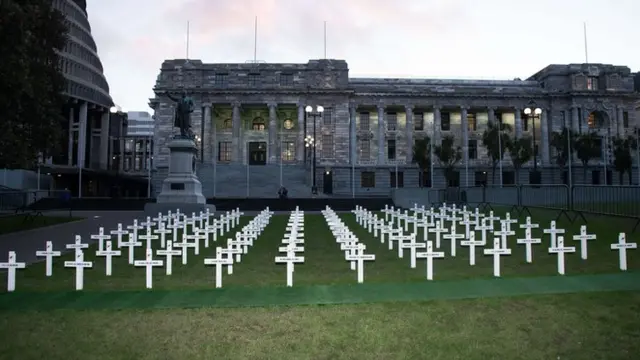 Image source, Getty Images
Image source, Getty ImagesThose who fell in the war are also being remembered further afield. Here, 100 white crosses with some of the names of the victims of the conflict are pictured outside the New Zealand Parliament in Wellington.
Andrew Hadden texts: John Parr might have been the first soldier killed in WW1 but quite a lot of Royal Navy sailors had been killed in action before his untimely death. They should also be remembered.
 News from 1914
News from 1914
The world on the brink of war
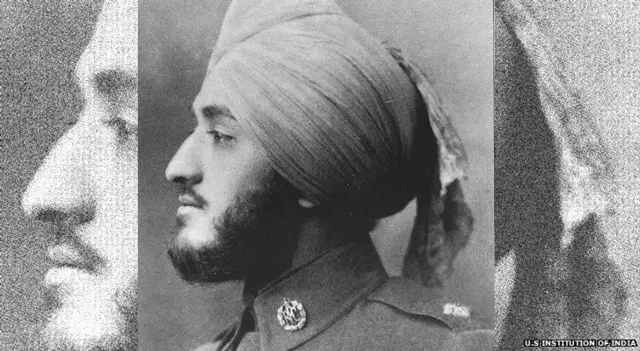 Image source, U.S Institution of India
Image source, U.S Institution of IndiaHS Malik, the first Sikh to fly with the Royal Flying Corps
War across the British Empire
Soldiers from across the British Empire served with the Allied forces, including from South Africa, Canada, Australia, New Zealand and India.
As war broke out, HS Malik was a student at Balliol College, Oxford. He became an ambulance driver for the French Croix Rouge, and went on to become the first Sikh to fly with the Royal Flying Corps. On one occasion he managed to get his plane back inside the British lines despite having been shot in the leg and passing out through loss of blood after crash landing. The plane was later found to have more than 400 bullet holes.
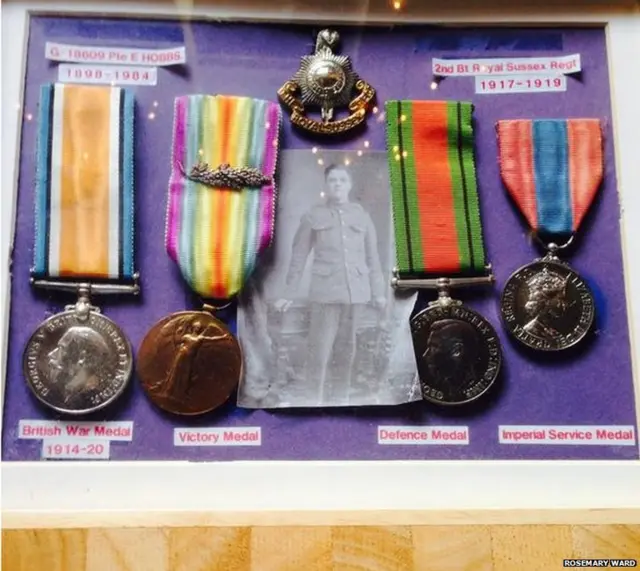 Image source, Rosemary WArd
Image source, Rosemary WArd@saffire1610 tweets, external: Remembering my granddad, Edward Hobbs 2nd Bat Ryl Ssx Regt today, the 100th anniversary of the outbreak of WW1
Professor Kathleen Burk, of University College London, has been on the BBC News Channel discussing the length and impact of the conflict. "The politicians said it was going to be short, people hoped it would be short, [but] the secretary of state for war knew it would be long and began to prepare for it," she says.
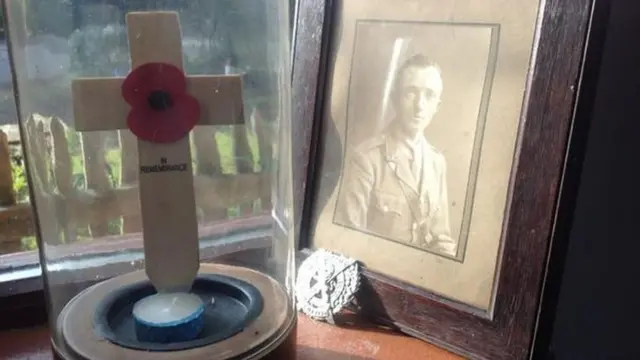 Image source, other
Image source, otherhardrock tweets, external: Getting ready to #remember 2nd lieutenant Edwin Cashmore Leicestershire Regiment 1st/4th Bn. Died 4/10/1918 our hero
 News from 1914
News from 1914
The world on the brink of war
How did WW1 change the way we treat war injuries today? A doctor and ex-Army officer explores the medical innovations from 1914.
Broadcaster Kate Adie has been speaking about the role of women in the conflict. "They came from every class of society, every family was affected," she tells BBC Breakfast. "The war was a total war in a way, I suppose, we have never quite experienced in this country. Women became both victims of it in bombings and they also were an enormously important part of the workforce, going into every sort of work, which before the war people thought they were totally incapable of."
Mr Cameron says one of the reasons we remember World War One is that it "so profoundly changed our world". As well as the devastating loss of life, he says the conflict led to positive developments including the emancipation of women and improvements in medicine.
 Nick Higham
Nick Higham
BBC News
In Mons at beautiful St Symphorien cemetery for WW1 commemoration: 1st and last Brit soldiers to die buried here. One of the many grim ironies of #WW1 is that Brit soldiers fighting on same ground at its end as at its start.
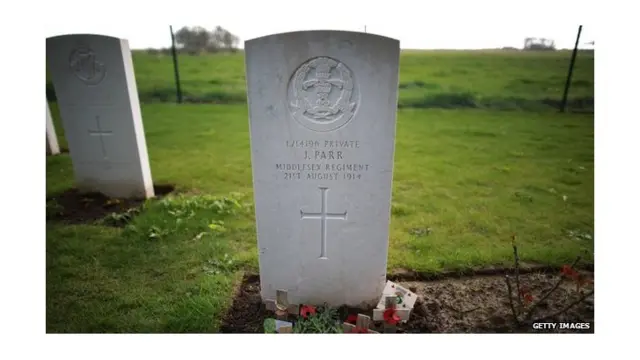 Image source, Getty Images
Image source, Getty ImagesThis evening, the Duke and Duchess of Cambridge will move on to the St Symphorien Military Cemetery in Mons. The cemetery is of particular significance as an equal number of both German and British soldiers are buried there. Among them lies Private John Parr, who was the first British soldier killed on the Western Front, and Maurice James Dease who was the first recipient of the Victoria Cross in WW1.
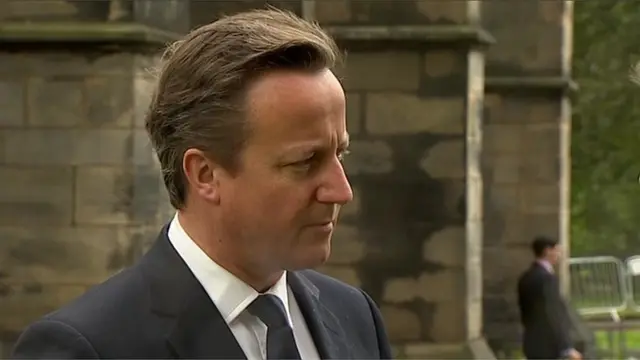
David Cameron is in Glasgow for a service this morning
Mr Cameron, speaking outside Glasgow Cathedral, adds: "When you think that almost every family, almost every community was affected, almost a million British people were lost in this war, it is right that even 100 years on, we commemorate it, we think about it and we mark it properly."
The Chancellor of the Exchequer George Osborne tweets, external: In Glasgow to attend Commonwealth commemoration of start of First World War. Solemn moment to reflect on sacrifice of a generation.
Prime Minister David Cameron is speaking to BBC Breakfast about today's commemoration events, and describes the outbreak of war as "an extraordinary day in Britain's history".
Jane Britton, of the Royal British Legion, tells BBC Breakfast why it is important to remember those who died during the war. "Nearly everybody in the UK has got an ancestor that was involved in some way in the First World War. Therefore it's important that they take a little time just to think and reflect on that," she says.
 News from 1914
News from 1914
The world on the brink of war
"The Austrian-Hungarian Government has declared war upon Serbia to safeguard her rights and interests, which were endangered by the unsatisfactory reply to her demands." Aberdeen Journal, 29 July 1914
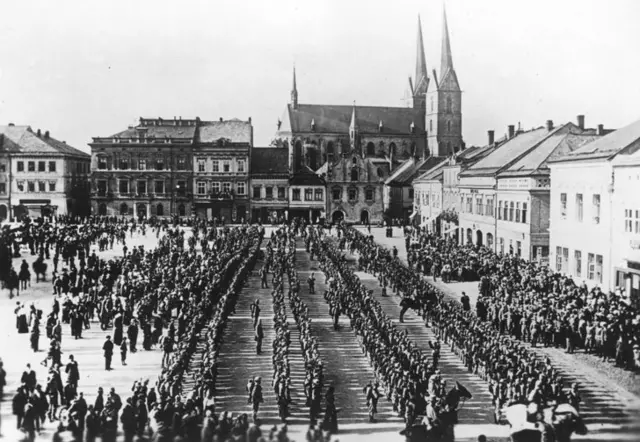 Image source, Getty Images
Image source, Getty ImagesThe Austrian army masses for war
Austria declares war on Serbia
On the 28 July Austria declared war on Serbia. They sought revenge for the assassination of Archduke Franz Ferdinand, the heir to the Austro-Hungarian throne.
This conflict would not be confined to the Balkans as Serbia was backed by Russia, while Austria was allied with Germany.
Events are also being held in:
Wales, with a national service of remembrance at Llandaff Cathedral in Cardiff from 22:00
Northern Ireland, with a service at St Anne's Cathedral in Belfast, attended by First Minister Peter Robinson and NI Secretary Theresa Villiers from 19:00